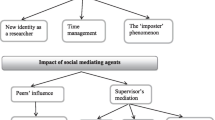Abstract
In this study we explore the work and the cooperation of academic and industrial supervisors concerning single graduate students in so called industrial research schools, which are financially supported by a national research foundation and involve universities and industrial enterprises. Academic and industrial supervisors of totally eleven graduate students have been interviewed with focus on their cooperation. This cooperation entails negotiating the contract and monitoring the progress of the research project and the student. When students have problems this cooperation is particularly important. The places new demands on both the academic and industrial supervisors. In our study these demands were dealt with differently by different academic supervisors, depending whether their main orientation was towards industrial projects or traditional academic research. The way the industrial supervisors dealt with the new demands depended on their previous acquaintance with academic research, basically whether they had a doctoral degree or not. Another important finding was that academic knowledge had a strong position while the supervisors from the industry accepted a minor role. The main findings of the study are that industrial graduate students often require joint engagement in a way that differs from other forms of knowledge transfer between the academy and the industry. To explain the features of this type of knowledge transfer, we use the analytical concepts boundary subject and phronesis.
Similar content being viewed by others
References
Behrens, Teresa R., & Gray, Denis O. (2001). Unintended consequences of cooperative research: Impact of industry sponsorship on climate for academic freedom and other graduate student outcome. Research Policy, 30, 179–199.
Croissant, Jennifer, & Restivo, Sal (Eds.) (2001). Degrees of compromise. Industrial interests and academic values. New York: State University of New York Press.
Eisner, Elliott E. (2002). From episteme to phronesis to artistry in the study and improvement of teaching. Teaching and Teacher Education, 18, 375–385.
Etzkowitz, Henry (2002). MIT and the rise of entrepreneurial science. London: Routledge.
Flaming, Don (2001). Using phronesis instead of ‘research-based practice’ as the guiding light for nursing practice. Nursing Philosophy, 2, 251–258.
Gemme, Brigitte, & Gingras, Yves (2004). Training a new breed of researchers, inside and outside universities. Working paper. (Paper presented at Unesco: Colloquium on research and higher education policy, ‘Knowledge, access and governance: strategies for change’).
Gibbons, M. et al. (1994). The new production of knowledge. The dynamics of science and research in contemporary societies. London: Sage.
Gustavsson, Bernt (2000). Kunskapsfilosofi. Tre kunskapsformer i historisk belysning. Stockholm: Wahlström & Widstrand.
Gustavsson, Bernt (2004). Revisiting the philosophical roots of practical knowledge. In J. Higgs, B. Richardson, & M. Abrandt Dahlgren (Eds.), Developing practice knowledge for health professionals (pp. 35–50). Edinburgh: Butterworth-Heinemann.
Hackett, Edward. J. (2001). Science as a vocation in the 1990’s: The changing organizational culture of academic science. In: J Croissant, & S. Restivo (Eds.), Degrees of compromise. Industrial interests and academic values. (pp. 101–138). New York: State University of New York Press.
Handbook for postgraduate students (2005). Stockholm: National Agency for Higher Education. Retrieved May 22, 2007 from http://www.doktorandhandboken.nu/english/.
Harman, Kay (2002). The research training experiences of doctoral students linked to Australian Cooperative Research Centers. Higher Education, 44, 469–492.
Harman, Kay (2004). Producing ‘industry-ready’ doctorates: Australian Cooperative Research Center approaches to doctoral education. Studies in sContinuing Education, 26(3), 387–404.
Johnson, Deborah G. (2001). Conflicts of interest and industry-funded research: Chasing norms for professional practice in the academy. In J. Croissant, & S. Restivo (Eds.), Degrees of compromise. Industrial interests and academic values (pp. 185–198). New York: State University of New York Press.
Rynes, Sara I., Bartunek, Jean M., & Daft, Richard L. (2001). Across the great divide: Knowledge creation and transfer between practitioners and academics. Academy of Management Journal, 44(2), 340–355.
Santoro, Michael D., & Chakrabarti, Alok K. (2002). Firm size and technology centrality in industry-university interactions. Research Policy, 31, 1163–1180.
Saugstad, Tone (2002). Educational theory and practice in an Aristotelian perspective. Scandinavian Journal of Educational Research, 46(4), 373–390.
Schild, Ingrid, & Hanberger, Anders (2000). Industrial research schools. A real-time evaluation of the Swedish Knowledge Foundation’s research school programme. Evaluation Reports No 6. Umeå: Umeå Centre for Evaluation Research.
Slaughter, Sheila, et al. (2002). The “traffic” in graduate students: Graduate students as tokens of exchange between academe and industry. Science, Technology & Human Values, 27(2), 282–312.
Star, S. L., & Griesemer, J. (1989). Institutional ecology, “translations” and boundary objects: amateurs and professionals in Berkeley’s museum of vertebrate zoology, 1907–1939. Social Studies of Science, 19, 387–420.
Wallgren, Lillemor, & Dahlgren, Lars-Owe (2005). Doctoral education as social practice for knowledge development: Conditions and demands encountered by industry PhD students. Industry and Higher Education, 19(6), 433–443.
Wallgren, Lillemor, & Hägglund, Sture (2004). The Industry Doctoral Student—An educational challenge for academia and industry. In S. Hemlin, et al. (Eds.), Creative knowledge environments. Cheltenham: Edward Elgar Publishing.
Acknowledgement
This research project was supported by a grant from The Bank of Sweden Tercentenary Foundation.
Author information
Authors and Affiliations
Corresponding author
Rights and permissions
About this article
Cite this article
Salminen-Karlsson, M., Wallgren, L. The interaction of academic and industrial supervisors in graduate education. High Educ 56, 77–93 (2008). https://doi.org/10.1007/s10734-007-9090-4
Received:
Accepted:
Published:
Issue Date:
DOI: https://doi.org/10.1007/s10734-007-9090-4




